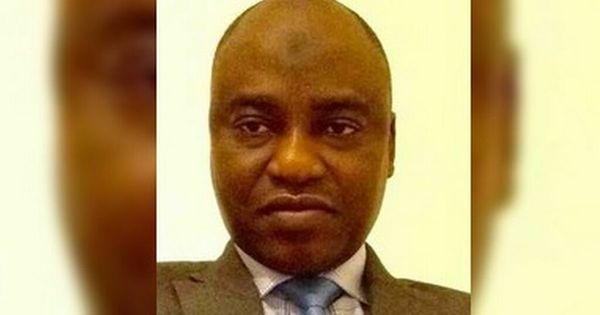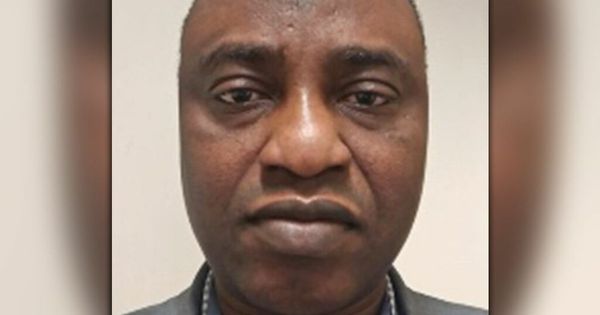An NHS doctor has been struck off today for faking his CV, bringing to an end his 27-year career in medicine.
Police questioned Dr Hakeem Lateef, 54, after he tried to get a job in finance just six weeks after he was suspended for lying about his involvement in a head-on car crash.
Lateef paid a bank worker £400 to attend a one day Co-op course on due diligence work then gave him a further £100 to ''edit'' his CV and include referees as part of an elaborate scam.
The doctor used this CV to convince a recruitment agency he had worked as a compliance analyst for a string of financial organisations including the National Bank of Egypt and the Nationwide banks.
But Lateef, who has worked in orthopaedics and trauma, ENT, general surgery and urology at hospitals across the UK, was discovered to be making false claims about his experience.
A special Co-op investigator carrying out an internal probe found two copies of Lateef's CV on the worker's computer hard drive - one showing the doctor's medical experience and the second with the faked entries, and the police were called.
Lateef denied wrongdoing claimed his PC had been ''hacked.''
No criminal action was taken against him for attempting to obtain a pecuniary advantage by deception, but he was referred to the General Medical Council.
Lateef, from Toxteth, Liverpool, who has most recently been working in drug and alcohol detox services was found guilty of serious professional misconduct and dishonesty, at the Medical Practitioners Tribunal service, in Manchester.
The hearing was told how in March 2018 Lateef who previously worked as a police and military forensic medical examiner had been suspended by the MPTS for six months when he was found guilty of falsely understating a woman's injuries when he was convicted of dangerous driving at a court hearing in 2016.
The following month he paid the bank worker, known as Mr A, £400 to attend a one-day course titled, ‘Intensive and practical Know Your Customer, Customer Due Diligence training.’
The following day Lateef emailed a copy of his CV and asked Mr A to "write" or "edit" it, adding, "Thank you for wonderful lectures of yesterday. I understand someone can help us with referees. Please assist me in this area."
He also paid him a further £100 for his services.
Later Lateef falsely bragged of his work in regulatory compliance and tackling money laundering and emailed his faked CV to Bristol-based recruitment agency Emponics which specialises in the finance industry.
The new CV made no reference to Lateef’s medical qualifications or experience. But he also fraudulently claimed to have worked for two years for the London-based specialist International Bank FBN which facilitates trade between Africa and Europe.
Lateef was later interviewed by Greater Manchester Police and accepted attending the course and paying for his original CV to be edited. But he denied submitting the updated CV to Emponics and suggested that his computer may have been hacked.
During the interview, Lateef admitted to having never worked in the financial sector.
He said he had asked Mr A to "tidy up" his CV only to be 'shocked and flabbergasted when he received the updated version.
Lateef claimed he confronted Mr A saying: ''Why did you leave my CV and produce something else? I’m not going to use this kind of CV not forever."
He got the response: ''They won’t employ you if you don’t show work experience in these areas."
Dr Lateef told officers: "I just binned the updated CV because I thought this is ridiculous. I didn’t do anything with it. I definitely deleted it and put it in the trash."
He then claimed his computer had been hacked by a female friend who sent the CV to the recruitment agency.
But finding him guilty of misconduct, tribunal chairman Tim Bradbury said Lateef's account was ''inconceivable.''
He added: ''The Tribunal did not consider it credible that someone unknown had ‘hacked’ Dr Lateef’s email account and submitted a job application on his behalf without his knowledge.
''Even if Dr Lateef had not sent the emails himself, correspondence from Emponics would have been sent to his email account, to which Dr Lateef had access.
"It was therefore unlikely that Dr Lateef would not have noticed the incoming emails.
''The Tribunal noted the request for help with referees and did not understand why Dr Lateef would have thought Mr A would have been able to assist when Mr A and those that he worked with knew nothing about Dr Lateef beyond that contained in the original CV.
''There is no evidence that he went any further in pursuing employment in the financial sector.
"However, thereafter he maintained an untruthful account and at no stage did he seek to withdraw the application nor inform others as to the falsity of the CV that he had submitted.
''The Tribunal determined that, in light of his knowledge at the time at which the updated CV was sent, his actions in so doing were self-evidently dishonest by the standards of ordinary decent people.''
Mr Bradbury added: ''The Tribunal acknowledged that at the time of the events, Dr Lateef was facing extremely challenging personal circumstances.
"However, a factor of these circumstances related to his suspension following the finding of dishonesty by a previous tribunal.
''He acted in a deliberately dishonest way in order to secure employment he would not otherwise have obtained, and his conduct was properly characterised as fraud.
"He has demonstrated that his integrity could not be relied upon.
''Wholly fictitious information was provided within the CV which had been prepared for the purpose of obtaining a responsible position in a bank, namely regulatory compliance and anti-money laundering and an employment for which Dr Lateef was completely unqualified.
"He has not shown any understanding or insight into the seriousness of the findings that have been made against him.''
In a statement to the hearing Lateef who worked at Withybush Hospital in Pembrokshire, University Hospital in Cardiff, Royal Liverpool University Hospital, Derriford Hospital in Plymouth and Peterborough and Stamford Hospital NHS Trust, between 2006 and 2017 said: ''I ensure that what is entrusted to me is kept in trust.
''I have not broken the trust reposed in me by my clients and other staff. I have also made sure that nobody has access to my email address and other sensitive and work-related documents.
''Since the incident, I have always been checking and making sure that the courses I attend are accredited by well-known bodies and organisations with integrity and reputation.
"I also make sure that I do not send my CV to any unverified entities that lack integrity and probity.''










